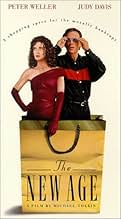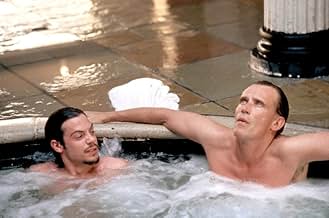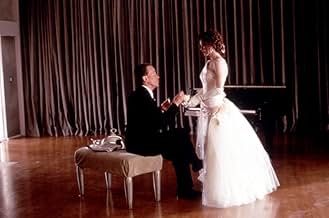IMDb RATING
5.6/10
1.4K
YOUR RATING
Episodic story about a yuppie couple who're going broke, and can't decide if they want to stay together - but openly sleep around and experiment with different lifestyles, or not.Episodic story about a yuppie couple who're going broke, and can't decide if they want to stay together - but openly sleep around and experiment with different lifestyles, or not.Episodic story about a yuppie couple who're going broke, and can't decide if they want to stay together - but openly sleep around and experiment with different lifestyles, or not.
- Awards
- 1 win total
- Director
- Writer
- All cast & crew
- Production, box office & more at IMDbPro
5.61.3K
1
2
3
4
5
6
7
8
9
10
Featured reviews
I LIKED IT!
Yes, The New Age is beguiling art film and not for everyone, but I enjoyed its take on the L.A. nouveau riche set. Peter Weller and the luscious Judy Davis are back again as a whacked out couple that are not unlike the pair they played in Cronenberg's Naked Lunch. I liked the look of the film, the off the wallness of it all, and its sly sense of humor. We need another reteaming of Weller and Davis for the new millenium, daddy-o. But if you like art movies about the rich bitch L.A. scene go see The New Age. Solid.
It bites!
This film was a complete surprise to me. It's clever, funny and very thought-provoking. Judy Davis and Peter Weller (that man is underrated) both deliver excellent performances. A warning: The ending isn't quite the usual happy salvation, but it really does hit the perfect note on one of the main themes of the film: You can't always get what you want. And pushing that very feeling to the viewer just before the credits is perhaps the cleverest thing about the whole film.
Satire of Hollywood phonies itself comes off as a poser...
Writer-director Michael Tolkin, whose 1991 film "The Rapture" was one of the best films of its year, let his talents go to waste with this absurd comedy of lost morals. A graphic designer and her Hollywood honcho husband are in big financial trouble: she has no clients and he just quit his job. Some of their survival solutions are quirky and interesting, but the characters are off-base right from the start. Tolkin is the new Sidney Lumet: everyone screams irrationally at everyone else, but it's tough discerning whether or not we're supposed to laugh at these banal verbal matches, often from opposite ends of the swimming pool! The leads present another problem: Judy Davis and Peter Weller are brilliant actors, yet they can't work up any semblance of chemistry together as this high-powered married couple on a tightrope. A few of their marital predicaments are worked out amusingly (they separate within the house, and date others), but their jealousies and insecurities are a bore. Tolkin (also the screenwriter of "The Player") pretends to know these people (he's pseudo-hip). It would be to his ultimate advantage if he broadened his horizons...maybe it's time he left L. A. and make some new friends? *1/2 from ****
I LIKED IT TOO!!!!!!!
Yuppie couple. Falls on hard times. After too many good times. Lose jobs. Have affairs. Have crisis of identity. Then set up in business.
That's a rough sketch of what happens, and it's quite watchable. Judy Davis looks incredibly young and sexy. So does Peter Weller. And it's written by Olly Stone too...What more do people want?
I Never 'New' It Was This Good!!!
That's a rough sketch of what happens, and it's quite watchable. Judy Davis looks incredibly young and sexy. So does Peter Weller. And it's written by Olly Stone too...What more do people want?
I Never 'New' It Was This Good!!!
Mess or Masterpiece?
Critics seem to have split widely on this film, and it's easy to see why. It's a rather painful, plodding thing to sit through--yet one can't get it out of the mind afterward. Writer/director Tolkin has a lot of disturbing things to say about post-industrial affluence in America in the 1990s, and in trying to say everything in one movie he has piled it on so thick that the brain requires a postmortem to reflect. Judy Davis, as she was in "Husbands and Wives," is dynamite, and the film is worth seeing just for her. The film has an uncanny eye and feel for the bleak interiors of the contemporary American service economy: the boutiques, the high-rise telemarketing boiler rooms, the house-poor interiors of career people who are hardly ever at home, etc. The film's title refers to the spiritual quest of the couple to find a meaning to their existence, or at least some alternative approach to life to their destructive materialism. How they go about it is all wrong, of course. In true hedonist fashion, they try everything. At the same time they seek a simpler, spiritual, non-materialistic life via a bunch of wacky gurus and cultists, they are indulging in carnal and other pleasures as diversions. When they open a small business, ostensibly to gain more control over their lives and income, the forces of the world are worse than any bosses. In all of this, they seem to be outside of everything they do, as in dreams when you watch yourself and are powerless to control the changing scenery. Despite their doldrums and hostility, this is a couple who have too much in common to split. During the course of all this, Tolkin gets plenty of jabs in about an American economy that seems to be teetering on wisps of hope rather than on any true productivity. By the end, the "new age" looks uncomfortably like a very old one, in which the law of the jungle reigned.
Did you know
- TriviaWas #9 on Roger Ebert's list of the Best Films of 1994.
- Quotes
Peter Witner: Did you know that in Chinese the word for "crisis" is the same as the word for "opportunity"?
- ConnectionsFeatured in Siskel & Ebert: Why Gump? Why Now? (1994)
- How long is The New Age?Powered by Alexa
Details
Box office
- Gross US & Canada
- $245,217
- Opening weekend US & Canada
- $35,797
- Sep 18, 1994
- Gross worldwide
- $245,217
- Runtime
- 1h 52m(112 min)
- Sound mix
- Aspect ratio
- 1.85 : 1
Contribute to this page
Suggest an edit or add missing content









































